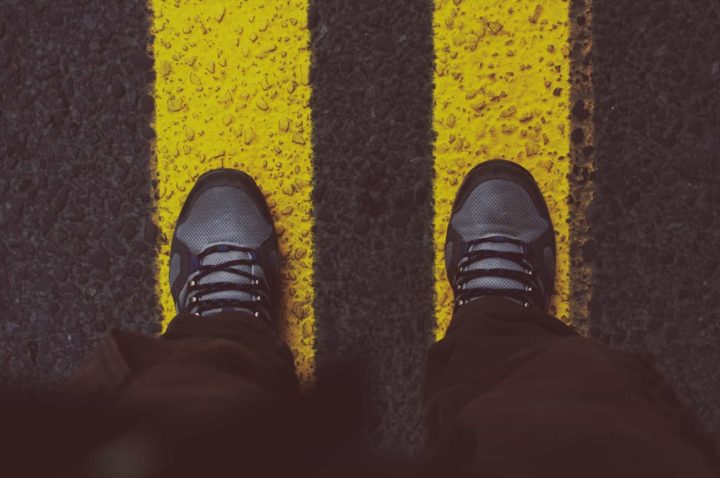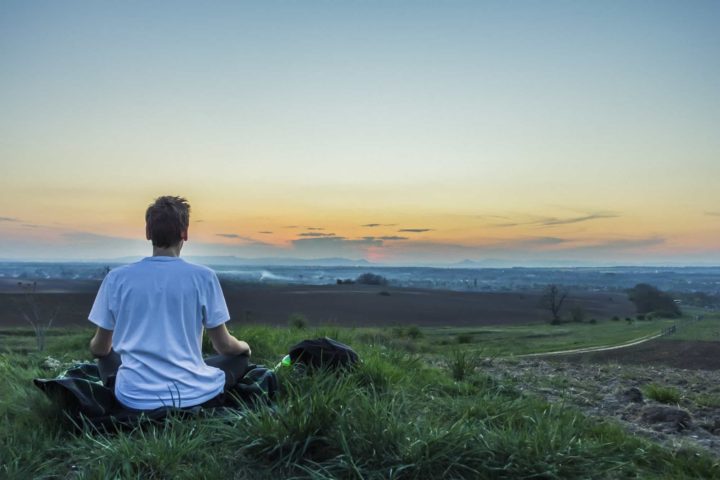I feel miserable, unfulfilled and unhappy as soon as I stay “withdrawn from society” for too long.
I usually lock myself away for days in a row, barely talking to anyone. There were even days I didn’t even say one word. Social interactions were cut to the bare minimum. That is when I get the most of my work done though. I can focus on the task at hand and really dive in.
But this work mode literally drains on my overall “happiness”. I can feel it. I just successfully ignored one of the four major pillars in life: health, wealth, love and happiness – and my life gets out of balance because now only three of the four pillars have to carry the complete cargo (which is my life).
Although I got some fulfillment and happiness from the work I have accomplished I totally ignored the social aspects of my life and it crumbled. Days later, I then have to FORCE myself to go out and meet people, talking to them. Because I have neglected this social side of myself for way too long, connecting with other people became unnatural and weird already.
Breaking out of this mode is hard and everything inside me tells me to just stay in place and keep doing what I am doing (or not doing). Yet I know I have to push through and afterwards I feel relieved and “normal” again. And then, I feel ready to go solo for some days again, just to repeat it all the next week once more.
There are some studies out there which have shown that the quality of one’s life depends on two major factors: how we experience and perceive work, and our relations with other people. The most detailed information about who we are as individuals comes from those we communicate with, and from the way we accomplish our jobs. You can tell so much about a person just by looking at these two areas of his life alone. Our happiness and even our self is so greatly defined by what happens in those two contexts. As Sigmund Freud said: “Love and work are the cornerstones of our humanness.”
It makes a great difference to the quality of the experience whether if we are in the company of others or not; because nobody likes to be alone.
We are biologically programmed and socially conditioned to find other human beings the most important objects in the world. They can make life either very interesting and fulfilling or utterly miserable and draining. Therefore how we manage relationships with them makes an enormous difference to our happiness. If we learn to make our relations with others more pleasant experiences, if we can work on improving our relationships, our quality of life as a whole is going to be much improved.
On the other hand, we also value privacy and often wish to be left alone (at least I do). Yet it oftentimes turns out that as soon as we are alone then, we begin to grow miserable and depressed (I am guilty for that as well).
It is typical for people in this situation to feel lonely, to feel that there is nothing to do and that there is no challenge or even purpose in our given time. It is very difficult to accomplish any task that requires undivided concentration, unless one learns to tolerate and even enjoy being alone. For this reason, it is crucial to find ways to control our consciousness even when we are left to ourselves and there is no supervisor who tells us what to do next, and there is no boss who orders us around.
Of all the things which might frighten us, the fear of being “left out”, “to be excluded from our group”, “to not belong”, is certainly one of the worst. We are social animals; and only in company of other people do we feel complete.
As Mihaly Csikszentmihalyi puts it in his book “Flow: The Psychology of Optimal Experience”![]() : “In the preliterate cultures solitude is thought to be so intolerable that a person makes a great effort never to be alone; only witches and shamans feel comfortable spending time by themselves. In many different human societies – Australian Aborigines, Amish farmers, West Point cadets – the worst sanction the community can issue is social rejection. The person ignored grows gradually depressed, and soon begins to doubt his or her very existence. In some societies the final outcome of being ostracized is death: the person who is left alone comes to accept the fact that he must be already dead, since no one pays attention to him any longer; little by little he stops taking care of his body, and eventually passes away. The latin locution for “being alive” was “inter hominem esse”, which literally meant “to be among men”; where “to be dead” was “inter hominem esse desinere”, or “to cease to be among men.” Exile from the city was, next to being killed outright, the most severe punishment for a Roman citizen; no matter how luxurious his country estate, if banished from the company of his peers the urban Roman became an invisible man.”
: “In the preliterate cultures solitude is thought to be so intolerable that a person makes a great effort never to be alone; only witches and shamans feel comfortable spending time by themselves. In many different human societies – Australian Aborigines, Amish farmers, West Point cadets – the worst sanction the community can issue is social rejection. The person ignored grows gradually depressed, and soon begins to doubt his or her very existence. In some societies the final outcome of being ostracized is death: the person who is left alone comes to accept the fact that he must be already dead, since no one pays attention to him any longer; little by little he stops taking care of his body, and eventually passes away. The latin locution for “being alive” was “inter hominem esse”, which literally meant “to be among men”; where “to be dead” was “inter hominem esse desinere”, or “to cease to be among men.” Exile from the city was, next to being killed outright, the most severe punishment for a Roman citizen; no matter how luxurious his country estate, if banished from the company of his peers the urban Roman became an invisible man.”
Maybe this is what drains me so much, when I am actively withdrawing myself from society to focus and get some work done. I guess if I would keep going further into isolation, I would not be able to tell the difference if somebody cares about me or not.
Social science surveys have universally concluded that people claim to be most happy with friends and family, or just in the company of others. When they are asked to list pleasant activities that improve their mood for the entire day, the kind of events most often mentioned are “being with happy people,”, “having people show interest in what I say,” “being with friends,” and “being noticed as sexually attractive.” One of the major symptoms that sets depressed and unhappy people apart is that they rarely report such events occurring to them.
A supportive social network also mitigates stress: an illness or other misfortune is less likely to break a person down if he or she can rely on the emotional support of others.
It is also no coincidence that in the book “The Millionaire Mind”![]() by So, if you manage to build a social circle which can support you in case of emotional stress or hardship, you will feel much more likely to bounce back and recover.
by So, if you manage to build a social circle which can support you in case of emotional stress or hardship, you will feel much more likely to bounce back and recover.
It’s like a safety net which you can rely on. And you no longer have to carry all the baggage all by yourself. Sharing is caring!
There is no question that we are programmed to seek out the company of peers. It is likely that sooner or later behavioral geneticists will find in our chromosomes the chemical instructions that make us feel so uncomfortable whenever we happen to be alone.
There are good reason why, during the course of evolution, such instructions should have been added to our genes. Animals that develop a competitive edge against their species through cooperation survive much better if they are constantly within sight of one another. Baboons, for instance, who need help from peers to protect themselves against the leopards and hyenas roaming the Savannah, have a slim chance of reaching maturity if they leave their troop.
The same conditions must have selected for gregariousness as a positive survival trait among our ancestors. Of course, as human adaptation begin to rely increasingly on culture, additional reasons for sticking together became important. For instance, the more people grew to depend for survival on knowledge instead of instinct, the more they benefited from sharing their learning mutually. Or as Mihaly Csikszentmihalyi puts it:
“A solitary individual under such conditions became an idiot, which in Greek originally meant a “private person” – someone who is unable to learn from others.”
At the same time, paradoxically, there is a long tradition of wisdom warning us that “hell is other people.” There are people out there who preach to “go out and find yourself”, but I already wrote in another article on why this won’t work. The Hindu sage and the Christian hermit sought peace away from maddening crowd, in order for them to become enlightened. When we examine the most negative experiences in the life of average people – on the other hand – we find the other side of the coin. The most painful and events are most of the times those which involve relationships. Unfair bosses and rude customers make us unhappy on the job.
At home an uncaring spouse or even an ungrateful child is causing us distress or anxiety. So, how is it possible to reconcile the fact that people cause both the best and the worst times?
This is actually not that difficult to answer. Like anything else that really matters to us, relationships make us extremely happy when they go well, and very depressed when they don’t work out. The people around us seem to be the most changeable aspect of the environment we have to deal with. The same person can make the morning wonderful and the evening miserable. Because we depend so much on the affection and approval of others, we are extremely vulnerable to how we are treated by them. I don’t believe that has to be the case forever.
Oftentimes getting rid of your ego can do all the magic. And more than often it is your ego in the first place which gets offended – not you. I found if you leave your ego aside, your relationships tend to flourish.
Although there might be chaos all around you, you are the only constant, yet you can change every new day.




